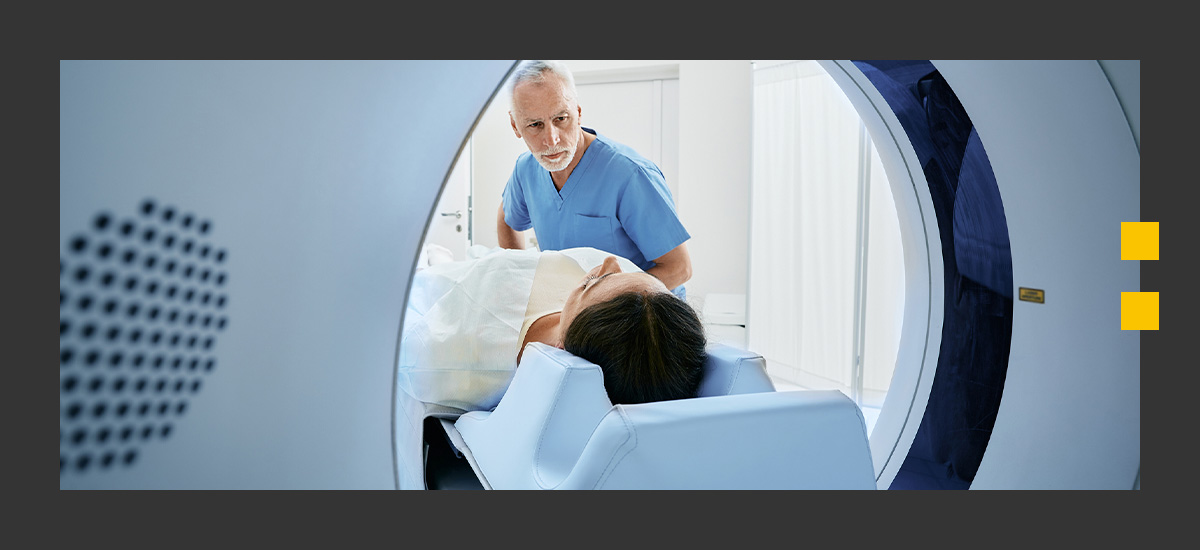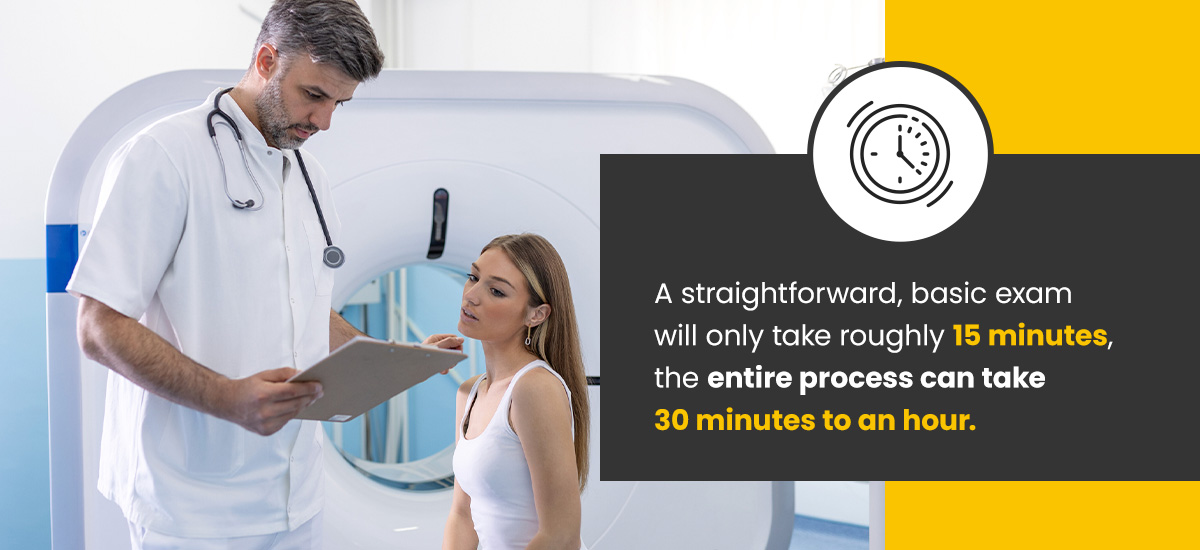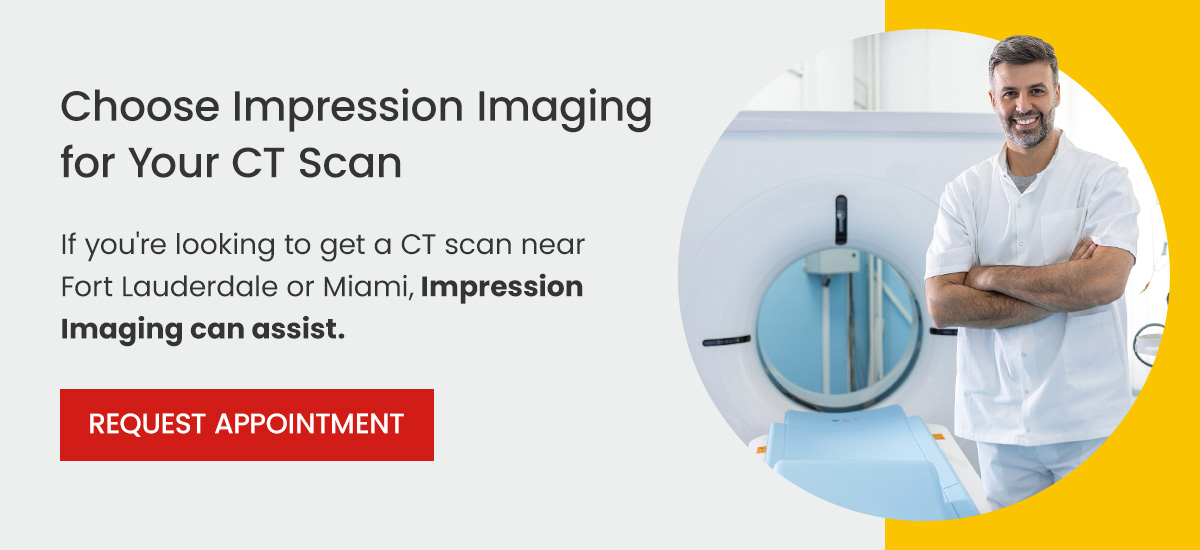
A computed tomography scan (CT scan) uses a combination of X-ray technology and computer processing to create a detailed cross-section of the human body. X-rays give health care professionals a 2D image, but a CT scan provides a 3D perspective, allowing them to better assess what’s happening internally for a patient.
What is the most common reason for a CT scan? Learn about why you might need a CT scan and what you can expect when you get one.
What Does a CT Scan Involve?
A CT scanning device is a large, open, doughnut-shaped machine. Once you enter the machine, you’ll see an X-ray tube rotating around you, emitting controlled beams you can’t see. These beams pass through your body and are picked up by detectors on the other side, allowing the computer to gather data on density and imagery. The computer stacks all the images together to create a single 3D image.
What Is the Most Common Reason for a CT Scan?
A CT scan can detect the signs of various diseases, disorders and injuries, so your doctor may order you one for different reasons. Commonly, physicians recommend CT scans to help diagnose muscle or bone disorders, find a tumor or provide guidelines on surgical procedures. In some cases, a CT scan can help detect a specific issue early, allowing the patient to start treatment more quickly if necessary.
Here are some examples of what a CT scan can detect:
- Bone fractures and injuries
- Cancerous tumors
- Lung and liver diseases
- Infections
- Internal bleeding
How Long Does a CT Scan Take?

A straightforward, basic exam will only take roughly 15 minutes, but you should also consider the time it’ll take to change into the gown, remove any jewelry and get on the scanning table. In total, the entire process can take 30 minutes to an hour.
Additionally, some CT scans use a contrast dye method that will highlight vessels or tissues. Administering the dye can increase the time of the whole appointment. Keep in mind that areas like the arms and legs are quicker to scan than more complex body parts like the brain or abdomen, so your appointment length will vary based on the purpose of the scan.
How to Prepare for a CT Scan
Before your scan, your health provider should give you a list of instructions so you can prepare for the exam. Be sure to follow every step on the list to ensure your CT scan can happen as planned. Most notably, you shouldn’t eat four hours beforehand, avoid using deodorant, lotion or perfume, and remove all metal from your body, such as jewelry.
If you find yourself worried about the scan, here are some tips you can try to manage your anxiety:
- Distract yourself: Give your brain something else to focus on, like a good book, craft project or TV show. Stay busy in the hours leading up to the exam to help keep your worries at bay.
- Meditate: Breathing exercises are a great way to slow down your body and heart rate. Try a guided meditation on different breathing exercises. Another idea is to play ambient music or sound effects.
- Talk to someone: Reach out to a friend or family member to discuss your concerns and share your feelings. You can also ask your health care provider for resources if necessary.
What Happens After a CT Scan?
Once you’re finished with the exam, the CT scan provider will process the information gained from the test and send it to your physician — the results will likely be delivered to your health care provider in a day or two. Then, you and your physician will discuss possible next steps as applicable based on the results.
Assuming you don’t experience a reaction from the dye, you should feel completely fine after the exam ends. Waiting for the results of your exam can be challenging, so you may want to form a plan to keep yourself calm after the exam ends. The most important thing to do is stay as positive as possible — even if the results are not what you expected, you can now take meaningful action to address the issue.
What Other Types of Scans Are There?
CT scans are just one type of imaging test. Other imaging tools are used for different types of applications, such as:
- X-rays: X-rays are the oldest method to diagnose fractured bones and look for infections. They use electromagnetic radiation to generate images of tissue and structures inside the body. Since the invention of CT scans, health care professionals have preferred to use those for soft tissue detection if available.
- Ultrasounds: Ultrasounds use high-frequency sound waves to create images. They are best known for use during pregnancy, but you may get an ultrasound for liver, heart and kidney imaging.
- Magnetic resonance imaging tests (MRIs): MRIs tend to focus on brain conditions like tumors but can also be used for examining other soft tissues. These machines use a magnetic field and radio waves to assess the body.
While CT scans can help detect and diagnose a variety of health concerns, your physician may decide that a different scan option is best for your specific health needs.
How Do You Know if You Need a CT Scan?
Typically, a doctor should order a CT scan to detect potential muscle and bone disorders, locate tumors or blood clots, find and monitor diseases such as cancer, or guide decisions for surgery or biopsies. Additionally, you can ask your doctor for a CT scan based on your health needs and see their professional perspective on it.
If your physician says that a CT scan isn’t necessary, know that you can ask for a CT scan in the form of a second opinion, which can help you make a more informed decision for your health. However, any physician will recommend CT scan alternatives if you are pregnant, have kidney issues or have metal implants.
Choose Impression Imaging for Your CT Scan
If you’re looking to get a CT scan near Fort Lauderdale or Miami, Impression Imaging can assist. Whether your doctor has recommended a CT scan for your head and face, spine, lower body, or chest, our advanced CT scan equipment can deliver body imaging results quickly and efficiently. Additionally, our HIPAA-compliant portal will send the results directly to your health care provider, so you can coordinate with them immediately in the following days.
If you need to schedule a CT scan appointment or want to learn more about how we can help with your imaging needs, reach out to us today, and our knowledgeable team will get back to you soon.



